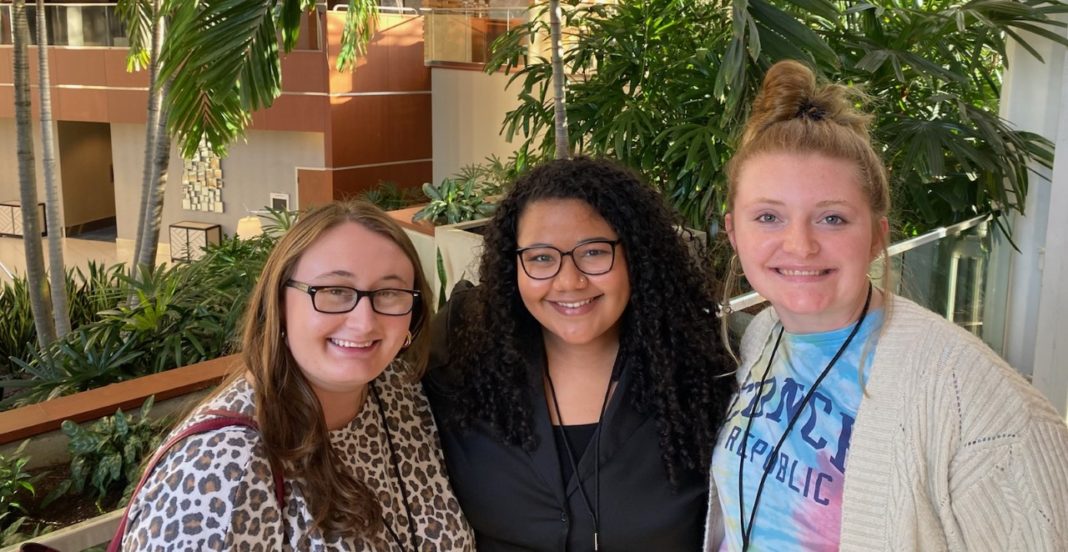
COOKEVILLE – Several students and faculty members represented Tennessee Tech University by making presentations and chairing panels at the 92nd Annual Southern States Communication Association Convention held recently in Greenville, South Carolina.
“Students that attend conferences benefit in several ways. It is a great networking experience, which can lead to graduate school opportunities such as assistantships or scholarships,” Scott Christen, associate professor of communication, said.
The students who attend the conference can get a better understanding of the communication field, according to Christen.
“It is one thing to read a journal article, it is another to be able to hear it presented and be able to ask questions of the author,” Christen said. “Makeya [Prince] and the other students that went to SSCA attended several sessions covering various topics, which may not be covered in as much depth in their classes.”
Prince, Brooklyn Driver Smith and Taylor Brake all made presentations on subjects they had co-authored with Tech faculty members at the conference.
“Co-authoring or helping a student submit an individual research piece to a conference is a great way to introduce them to research and the possibility of graduate school,” Christen said.
Most of the presentations at the SSCA are presented by either professors or graduate students, but undergraduates do present. SSCA has an undergraduate conference that is designed just for them on the third day of the conference. The presentations by Prince, SmitH and Brake were in the GIFTS section, which is not a part of the undergraduate conference, according to Christen.
“GIFTS stands for Great Ideas for Teaching Students. GIFTS falls under the area of instructional communication,” Christen said.
Prince, a senior communication studies major from Lebanon, co-authored a presentation with Christen, titled, “Changing How We Perceive Ourselves: A Practice in Lessening Self-Discrepancy.”
Prince created a lesson plan that she believed would be beneficial to other professors from different universities. The goal of the lesson is to educate students on what thoughts and actions can lead to self-discrepancy in themselves.
“Once students understand what self-discrepancy is, then they will be able to recognize it. Using a self-discrepancy lens will allow students to understand how they perceive themselves, which, in return, is how they perceive others,” Prince said.
The exercise is designed to show students how they can lessen their discrepancies so that their self-perception is not negatively affected.
“I received a lot of great feedback! Most people enjoyed my lesson plan, so they had fewer critiques and more new ideas that they thought would help expand the lesson plan,” Prince said. “A professor also proposed that they would love to use the lesson. They believe it would work even better if it was at the beginning of the semester and then also at the end, so that student would be able to see how they were able to lessen their self-discrepancies over a semester.”
Smith, a senior communication studies major from Lafayette, presented a GIFT on “Understanding Our Culture: A Journaling Exercise,” she co-authored with Jacob Metz, communication instructor.
Smith’s presentation was about focusing on teaching intercultural communication skills to entry level college students. She said she was inspired to create this activity based on the many students who attend Tech who come from small towns that have low diversity. These intercultural communication skills help them to better interact and build relationships with each other.
“I was so excited to even receive feedback on how the professors planned to customize my GIFT to fit their needs, ” Smith said. “For example, one professor was planning to adapt and use my activity in an online class when it was originally designed for an in-person activity.”
Brake, a senior business major with a minor in event planning, presented a GIFT over “Business Practices Pre and Post COVID,” she co-authored with Colleen Mestayer, communication lecturer.
Brake’s presentation was a teaching activity to help students learn about the business practices that were brought on by the pandemic. This allows students to “see” how real-world businesses had to adapt to stay in business, according to Mestayer.
Christen, Mestayer and Metz each chaired individual panels at the conference and each made separate presentations.
Mestayer chaired the panel “Revisiting the Basic Course: Changing Activities to Meet the Needs of a Changing Landscape,” Christen chaired the GIFTS 1 panel, and Metz chaired the panel “Revamping and Revisiting the Basic Course: Are We Meeting the Right Standards.”
The theme of this year’s SSCA conference was “Resilience Through Resistance,” which conference organizers chose after the past few years of uncertainty.
“This was the first time we had been together to present in person since the pandemic, so it was great to see everyone and to hear about all the great research that communication scholars are doing,” Mestayer said.
Tech sponsors the Undergraduate Research and Creative Activity research grant. This grant provides funding for the student and their sponsor to attend the conference. The URECA grant has helped hundreds of students from various departments present at conferences since its inception. Representatives of Tech’s communication department have been attending the SSCA conferences since 2011, according to Christen.








